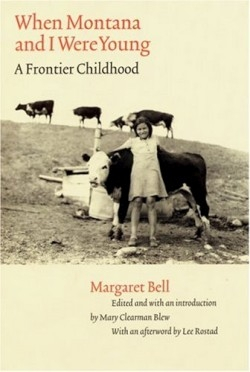When Montana and I Were Young
A Frontier Childhood
After she was lost for ten hours on the snow-covered prairie, the author tells about finally making it home: “I fed the cattle close to the corral. It worried me. It seemed as though I always had worried as long as I had to be around Hedge. Sometimes life seemed one terrible thing after another, until I wished I was dead and thought of ways I might die.”
She was all of twelve years old. The year was probably 1900 and this was Bell’s “childhood” growing up in the wilderness of America’s recently adopted forty-first state.
In direct, matter-of-fact language, Bell describes her life up to age eighteen, most of it spent with her violent, abusive stepfather, Hedge, and her three younger half-sisters after the death of their mother when she was eight. It was a difficult life early on. Young Bell was responsible for caring for her sisters—Beck, Nora, and Rose—and looking after the livestock and various cabins they lived in during Hedge’s perpetual search for a job that he could hold for more than a week.
Bell takes what comes and savors the unexpected joys: visiting with her maternal Irish grandma and Uncle Mike, a three-day-long Christmas celebration with neighbors, becoming friends at age nine with cowboy artist Charles M. Russell, and the pleasure of being around pet animals.
There seemed to have been a lot more disappointments than joys, though. Her stepfather’s behavior was always reprehensible; Bell did attempt suicide at age twelve, by strychnine poisoning that took Beck’s life instead; and arduous and never-ending work was put on her young shoulders.
Bell’s story was only recently rediscovered. An accomplished horsewoman, she first approached someone more than fifty years ago about publishing her manuscript. Various attempts were made to get her story told, but nothing came of them. She died in 1982 at the age of ninety-four in a Montana nursing home, still rewriting her entire memoir, the original having been lost along the way.
Just as fascinating are the introduction and afterword by Mary Clearman Blew, where readers learn what happened to Bell after she reached adulthood. When Montana and I Were Young is an unforgettable story that gives meaning to the term “true survivor.”
Reviewed by
Robin Farrell Edmunds
Disclosure: This article is not an endorsement, but a review. The publisher of this book provided free copies of the book to have their book reviewed by a professional reviewer. No fee was paid by the publisher for this review. Foreword Reviews only recommends books that we love. Foreword Magazine, Inc. is disclosing this in accordance with the Federal Trade Commission’s 16 CFR, Part 255.

